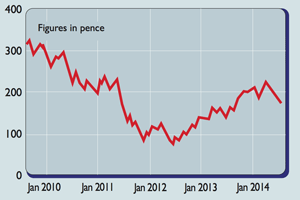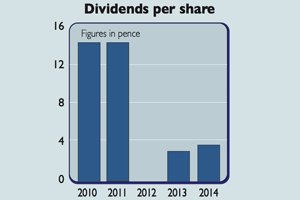Shares in focus: Can Argos thrive in the Amazon age?
Online commerce has been a thorn in the side of Argos? Can the high-street retailer thrive in the internet age? Phil Oakley investigates.
Get the latest financial news, insights and expert analysis from our award-winning MoneyWeek team, to help you understand what really matters when it comes to your finances.
You are now subscribed
Your newsletter sign-up was successful
Want to add more newsletters?

Twice daily
MoneyWeek
Get the latest financial news, insights and expert analysis from our award-winning MoneyWeek team, to help you understand what really matters when it comes to your finances.

Four times a week
Look After My Bills
Sign up to our free money-saving newsletter, filled with the latest news and expert advice to help you find the best tips and deals for managing your bills. Start saving today!
It's playing catch-up, but it might just make it, says Phil Oakley.
Home Retail Group owns two stalwarts of British high-street retailing: Argos and Homebase. These two businesses used to make lots of money for the company and its shareholders. Both were beneficiaries of the credit boom, which encouraged many consumers to go on a spending binge.
The recession and the increasing quantities of goods being bought over the internet rather than on the high street has seen many high-profile retailers go to the wall. For those that have survived, life has become much tougher than it used to be.
MoneyWeek
Subscribe to MoneyWeek today and get your first six magazine issues absolutely FREE

Sign up to Money Morning
Don't miss the latest investment and personal finances news, market analysis, plus money-saving tips with our free twice-daily newsletter
Don't miss the latest investment and personal finances news, market analysis, plus money-saving tips with our free twice-daily newsletter
Amazon and the big supermarkets have been eating their lunch. These companies have used their immense buying power to offer customers lower prices. To survive, high-street retailers have to match them and do something different.
Home Retail has survived so far, but can it thrive in the internet age and give investors a good reason to buy its shares?
A bearish outlook
Online retailers such as Amazon don't have lots of shops that have to be paid for. So they can pass on their lower costs to customers in the form of lower prices, taking market share from traditional retailers.
A quick look at the profits of Argos and Homebase seems to show that a lot of damage has been done over the last six years. Both have done a reasonable job of holding on to most of their sales, but it has come at a big price. They have had to sacrifice margins to remain competitive and consequently are now earning much lower profits.
Back in 2008, Argos had annual trading profits of £376m and margins of 8.7%. In the year to March 2014, trading profits were £113m 70% lower and margins had fallen just 2.8%. It's been a similar story over at Homebase, which has struggled against the dominance of its rival B&Q in the DIY and home-improvement market.
Turnaround plans
These revolve around turning it in to an online retailer that sells more products for cheaper prices and gets them delivered to customers more quickly. The days of the Argos catalogue are firmly in the past.
Argos currently has 44% of its sales coming from the internet and has done a good job of making it easier for customers to order things. This should get better over the next year or so, as it improves its systems, allowing customers safely to store their credit cards details online and to get more convenient delivery times.
Argos is also aiming to broaden its appeal by increasing the range of products it sells: it now has more than 43,000 different products, compared to 17,000 back in 2006. It wants to have 75% of sales made over the internet by 2018.
One key to this is using its network of 734 stores to support online sales. One of the big problems with shopping on the internet is being at home to collect your stuff when it is delivered. Argos's store network has allowed it to become a big player in the click and collect' market and this gives it a competitive advantage.
It intends to offer top-quality customer service by operating a hub and spoke' network, where most items are kept in stock in 100 or so big stores and can be delivered to smaller local stores to be picked up by customers. Having its own in-house logistics resources will help it to do this.
Home Retail is banking on a slowly recovering economy to help Argos grow profitably. It is aiming to generate sales of £4.5bn by 2018, with profit margins of around 5%. This looks very ambitious, but could be manageable, especially as competitors such as Tesco have big problems of their own to deal with. If it succeeds, profits will double.
Homebase is arguably more difficult to fix. But as it only accounts for a small portion of overall group profits, its fate is less important to investors. There has recently been speculation in the press that this part of the business might be sold to turnaround specialists. That could be positive, as Homebase has arguably been a drag on Home Retail's share price.
Like a lot of retailers, Home Retail rents rather than owns its stores. Paying rent can be a big burden when sales go down. The good news is that 38% of its stores have rent renewals or break clauses coming up in the next five years.
This should allow Home Retail to close some underperforming stores and get its rent bill down.
That just leaves us with Home Retail's valuation. At first glance, a forward price-to-earnings (p/e) ratio of 14.5 times is no bargain. It makes you think that any potential recovery has already been priced in.
However, Home Retail has just over £330m of cash in the bank about a quarter of its market value and no debt. Its strong finances make it a less risky investment, but also make its shares look more expensive than they really are. Stripping out the value of the cash puts the shares on a more reasonable adjusted p/e of 10.9. On this basis, they might just be worth buying.
Verdict: a risky buy
Home Retail Group (LSE: HOME)


Directors' shareholdings
Get the latest financial news, insights and expert analysis from our award-winning MoneyWeek team, to help you understand what really matters when it comes to your finances.
Phil spent 13 years as an investment analyst for both stockbroking and fund management companies.
-
 New PM Sanae Takaichi has a mandate and a plan to boost Japan's economy
New PM Sanae Takaichi has a mandate and a plan to boost Japan's economyOpinion Markets applauded new prime minister Sanae Takaichi’s victory – and Japan's economy and stockmarket have further to climb, says Merryn Somerset Webb
-
 Plan 2 student loans: a tax on aspiration?
Plan 2 student loans: a tax on aspiration?The Plan 2 student loan system is not only unfair, but introduces perverse incentives that act as a brake on growth and productivity. Change is overdue, says Simon Wilson